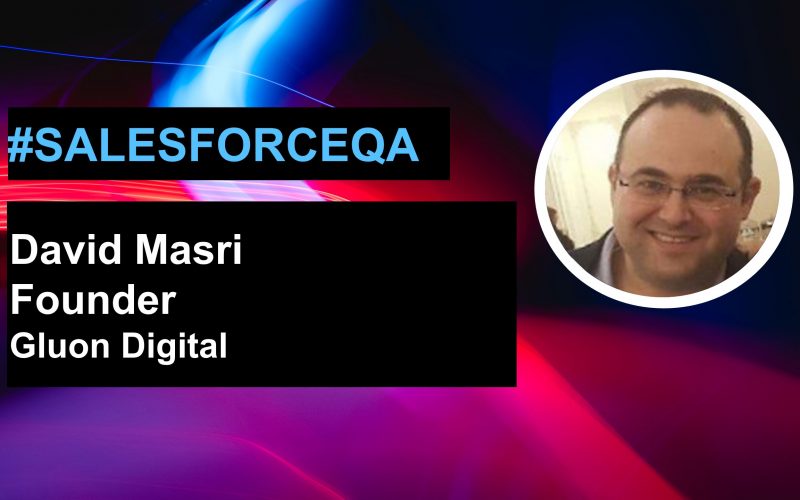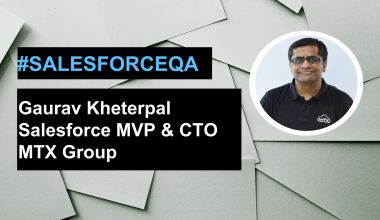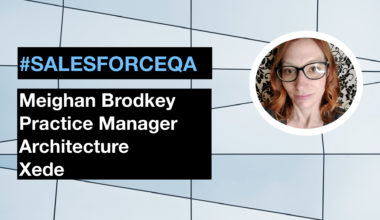In our most recent #SalesforceQA, we caught up with David Masri, Founder of Gluon Digital.
David discusses the benefits of getting involved with the community and how to overcome the main challenges for businesses when developing a data migration. David also offers his advice to offers looking to start their own business within the ecosystem.
Salesforce Republic (SR): To start, could you tell us a bit about what inspired you to start your own business, Gluon Digital, in the ecosystem?
David Masri (DM): It’s something that I have been thinking about for a while, but always had excuses to not do it, “I don’t have the right partners”, “I don’t know sales”, “I have bills and a mortgage, and a family that relies on my income to eat”, you know, things like that.
I ended up in a situation where I could start with a few anchor clients, these were people I worked with before and knew I would enjoy working with again. So last September,2020, I made the jump.
I also felt (and still feel) there is a real need in the market for a firm that specializes in working with data and Salesforce. We (at Gluon Digital) partner with Salesforce implementation partners to deliver the highest quality Salesforce data migrations for their clients (we do lots of other data work too, but for now we are heavily focused on Data migrations). We are not a Salesforce SI, we partner with SIs, we never compete with them.
- Our Website: https://Gluon.Digital
SR: What advice would you give to others looking to start their own business in the ecosystem?
DM: If you can land an anchor client or two, you can figure out the rest as you go. When you have revenue coming in you can afford to take your time and figure things out.
When I say figure thigs out, I mean the business side of things not your core competency. Also, this advice only really applies to a professional services type business. Product companies are a whole different animal.
SR: You have also released a book; “Developing Data Migrations and Integrations with Salesforce: Patterns and Best Practices”, could you tell us a bit about this?
DM: Yes! I wrote a book!
When I decided to write this book, I was putting together an advanced Data integrations training course for my then employer (Silverline), building on the work I did at Capgemini. It became clear that I had enough content for a book, and at the urging of my manager (Eric Nelson), I submitted an application to Apress.
When I decided to write it, the one thing I knew I was not going to do was rehash things that are easily found online or on trailhead. This book is all new content, with a lots of links (footnotes) to official documentation for further reading.
Unfortunately, there is a real lack of data talent, and to find people who know data well, and know Salesforce, AND want to work with Salesforce, is not easy. So, we end up with Salesforce Admins, BAs, and developers doing data work, very often they don’t have the skill set to do it (and don’t even like or want to do such work). The book was written with 2 audiences in mind, Salesforce people who want to learn data, and data people who want to learn to work with Salesforce.
Per the title, this is a patterns and best practices book, very focused on design and completely tool agnostic.
- Amazon Link: https://www.amazon.com/Developing-Data-Migrations-Integrations-Salesforce/dp/1484242084/
- A bit more about the book: https://www.linkedin.com/pulse/published-developing-data-migrations-integrations-salesforce-masri/
SR: What do you think are the main challenges for businesses when developing a data migration?
DM: Wow, there are so many… just to rattle off a few:
- Lack of talent who know how to work with data and Salesforce
- Legacy systems where no one knows the data model
- Legacy systems with data quality issues
- Over confidence, thinking this will be easy (i.e. lack of experience)
- Lots of bad/wrong information on the internet.
SR: Could you expand on that? How do you overcome such things?
DM: I’ll start with #5 because that one is unique to the Salesforce/Data Space. The others are very common and exist throughout the tech industry.
So, # 5 – Lots of bad/wrong information on the internet. Here’s what happens, you have people who are new to Salesforce or to data migrations, or work at small(ish) shops and they do a few small data migrations (usually using the Apex data Loader) and then they think “I can do Data Migrations to Salesforce!”, then they write a simple step by step how to blog article, and publish it.
This is the equivalent of writing a basic trigger, thinking “I can code APEX!”, then publishing a “How to code up Salesforce in 3 easy steps” article. Then you have a few dozen of these types of articles at the top of a google search. These types of articles just promote bad practices, the idea that it’s easy, and that there’s not much you need to know, when in fact there’s a whole field of practice. This is actually one of the reasons I wrote my book, as an attempt to get some solid content out there.
With regard to the rest, you basically have 3 options:
- Hire the right talent
- Build talent in house
- Hire a firm like Gluon
It’s very hard to build talent when you don’t already have solid talent in house. Once you have one good person, they can mentor others. The lead (mentor) can do the heavy lifting when it comes to data analysis (#2 – understanding the legacy system) and dealing with the data quality issues (#3). They also can act as a voice of reason when it comes to estimations and projections (#4) as the team is ramping up.
SR: You are an active member of the Salesforce community; speaking at events, running a blog, what do you think are the main career benefits of getting involved with the community?
DM: The networking, you meet a lot of great people. To be honest, and I know this is counter to the standard advice, but the amount of effort needed to write quality blog articles and prep for presentations and promote / coordinate events is probably not the best ROI in terms of career benefits. You can do almost as much networking by simply attending a few events and being active on LinkedIn. If you enjoy writing, write, if you enjoy speaking, speak.
- Link to my blog: https://salesforcedatablog.com/
SR: In your opinion, have the events of the past year impacted how the community interacts with each other?
DM: Meetups are fun, educational, and great for networking, meeting cool people with similar interests. Having no in-person meetings is different, I have noticed that Zoom meetups are simply more educational.
SR: What are your top tips for Salesforce professionals looking to network in this virtual world?
DM: “Provide value” – lol, I hate that term, it just feels so transactional. I prefer “Be helpful”. Help people out, people like helpful people. Don’t expect anything in return – because if you do, you will be disappointed.
SR: Finally, what is the best piece of advice you have received throughout your career?
DM: “Where you are going is more important than where you are.” There is nothing wrong with being behind, or starting over, as long as you keep yourself going in the right direction – the right for you direction.
Bonus Question: You spoke at a Salesforce Republic meetup about the importance of maintaining the quality of your CRM data – could you expand on this and provide steps on how this can be achieved?
DM: Obviously I can’t answer that here, it’s just way too much. But the recording of that talk is available online, as well as the original blog articles it was based off of.
· Recording: https://www.linkedin.com/pulse/salesforce-republic-talk-1072020-winning-war-against-bad-david-masri/
· Article 1 – Why are CRM systems so susceptible to bad data?: https://www.linkedin.com/pulse/faq-why-crm-systems-so-susceptible-bad-data-david-masri/
· Article 2 – Winning the War against bad CRM data: Https://www.linkedin.com/pulse/winning-war-against-bad-crm-data-david-masri/
If you’re a Salesforce professional and would like to join David in our Q&A series, please get in touch with us today!


